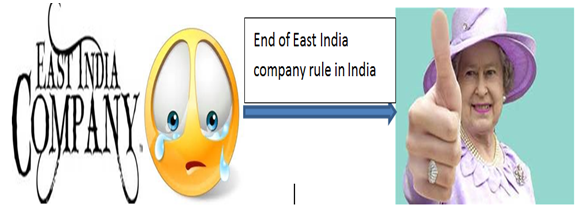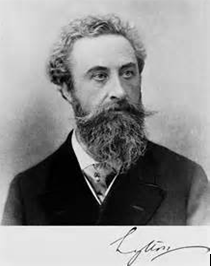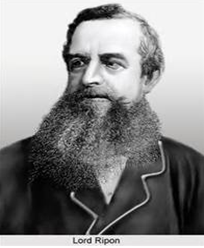Event 1: End of East India Company rule in India

This revolt came as last nail in the coffin of east India company rule in India. Various steps have taken by British parliament by passing act in 1858 under which:
- Whole control of India was shifted to British parliament and queen.
- A new post of Viceroy was created, who was the head of princely states in India and he directly reported to the queen of England.
- Governor General had to give his report to the British parliament. Normally, Both posts were held by one person at one time.
- Lord Canning was the governor general at that time, So he also become the first Viceroy of India.
- To handle the Indian affairs, Secretary of state post was created. Lord Stanley was the first in 1858.
Event 2: Indian council Act, 1861
- Portfolio(ministerial) system was introduced in India, 6-10 people were added into the governor council for legislative purposes through nomination only.
- Among them few can be Indians. First three Indians nominated are : 1) Maharaja of Patiala 2) Raja of Banaras and 3) SirDinkarrao
Event 3: Lord Lytton’s Reactionary Policies

- He set the maximum age limit for the I. C. S. examination to 19 years, this making it impossible for Indians to compete for it.
- He organized grand Delhi Durbar in 1877, when the country was in the severe grip of famine,.
- Lytton is responsible for vernacular Press Act under which he directed pre censorship for newspaper which means newspaper material had to submit with British before publishing.
Event 4: The Ilbert Bill Controversy

- Lord Ripon replaced Lord Lytton. He was considered as one of most pragmatic Governor General India ever had.
- He sought to abolish ‘Judicial disqualification based as race distinction’ and presentIlbert Bill sought to give the Indian members of the covenanted civil services the same powers and rights as the European colleagues enjoyed.
- The Bill raised a storm of agitation among the members of the European community and they all stood united against the Bill. Ripon had to modify the Bill that almost defeated the original purpose.
- The Ilbert Billcontroversy proved an eye opener to the Indian intelligentsia. It became clear to them that justice and fairplay could not be expected where the interests of the European community were involved. Further, it demonstrated to them the value of organised agitation.
AffairsCloud Recommends Oliveboard Mock Test
AffairsCloud Ebook - Support Us to Grow
Govt Jobs by Category
Bank Jobs Notification




